![]()
By Rob Harris
In the aftermath of the frenzied bloodthirsty terror attack on a twenty-five year old soldier in Woolwich (London) on May the 22nd 2013, political leaders made concerted efforts to paint a harmonious gloss on Islamic relations. Whilst the media acknowledged an Islamist element, they attempted to deflect focus from religious aspects of the attack by offering a politicised narrative, and reinforcing a view that the killers do not represent Islam.
RTE, Ireland’s state-funded national broadcaster, misrepresented the threat posed by Islamists in Britain. It was stated at least twice on RTE’s prime 6.1 (six PM) news slot that the savage murder was the first terrorist attack in mainland Britain since the 7/7 Underground Bombings in 2005! News presenter Eileen Dunne stated:
The attack in Woolwich was the first terrorist attack in mainland Britain since the Underground Bombings in July 2005. It’s led to a new debate about the threat posed to Britain by militarised radical Islamists.
Similarly, journalist Paul O’Flynn, in a pre-recorded report on the story, stated almost identically:
The moment terror returned to the streets of London. The cruel callous killing is the first terrorist attack in mainland Britain since 2005. Back then four young Islamists set off suicide bombs on public transport. 52 people died and hundreds were wounded.
Numerous other Islamist attacks on the British mainland, which went very much beyond a planning phase, have garnered substantial publicity. These include a co-ordinated attack just two weeks after 7/7, the 2007 London and Glasgow Airport attacks, and the 2008 Exeter Bombing. RTE features a very substantive amount of news content from the United Kingdom so this error represents a surprisingly large journalistic blunder.
Eileen Dunne’s claim was revised on the nine o’clock RTE News bulletin. The attack was now claimed to be the first “killing” since 2005. Paul O’Flynn’s report was also modified, and the claim was entirely removed. It is probable that complaints had been made about the factual content of RTE’s coverage.
The relevant RTE Player 6.1 video file (“First terrorist attack in mainland Britain since 2005”) remains on the website at the time of publication.
It is thought they were lone wolves similar to the suspects in the Boston Bombing.
So said Paul O’Flynn on 6.1 News, days after another suspect linked to the Boston Tsarnaev brothers, was shot dead by the FBI. The international media continues to label them as “lone wolf” terrorists, despite the gradual increase in arrests over the Boston Bombing, and the link with the Chechen region of Dagistan where Tamerlan Tsarnaev came to the attention of the Russian authorities after he met a known militant Islamist.
The English Defence League
RTE’s coverage of the terrorist attack, the day after the story emerged (23rd May), consistently labelled the English Defence League (EDL) as a “far-right” group (see RTE Player video clip entitled “UK Horror over Woolwich Murder”, which contains the relevant TV broadcast material), when reporting that there were some disturbances the previous night at a relatively modest protest in Woolwich, of approximately one hundred persons.
The label “far-right” carries essentially the same meaning as “fascist”. It also evokes neo-nazism. However, the media tends to apply the label to groups against immigration or the Islamic faith. The label is pejorative by its very nature, and as if to back up its implicit criticism, immediately afterward RTE featured an extended statement from a Muslim leader, one Asghar Bukhari of the ‘Muslim Affairs Committee UK’, a truncation of the name ‘Muslim Public Affairs Committee UK’. Bukhari stated, with reference to the Woolwich EDL protest:
And the EDL, classic kind of right-wing fascist group, have jumped on the bandwagon, and straight away they are out in the town centre…
Bukhari also brought up some highly emotive racial images to reinforce his criticism of the EDL:
What do they want from us? What do they want from the average Muslim, to hang us from the trees like what happened in the olden days to black people?
In March of this year, a critical report by Chatham House asserted that the EDL do not conform to the classic signifying features of a far-right group. Members were often found to be of a relatively high employment status, and were not alienated from the democratic process. Their preoccupation was seen to be cultural, and perhaps xenophobic, rather than characteristically racial. Overt Sikh support for the EDL is a signifier of the phenomenon.
Whether or not the EDL constitute a fascist/far-right group, it is a breach of basic journalistic standards for any broadcaster to fail to provide some reply to such sustained criticism of the group’s character.
The Muslim Public Affairs Committee UK
RTE did not express any overt opinion of the Muslim Public Affairs Committee UK (MPAC UK) but, within the context of the report, Bukhari was presented as a mainstream Islamic leader, and, by implication, the representative of a mainstream Islamic organisation. Immediately before Bukhari’s contribution on the EDL, RTE journalist Martina Fitzgerald stated:
Today local and national Muslim leaders intervened, and appealed for calm, condemning the murder in the strongest terms.
However, Bukhari was shown in the footage condemning the EDL rather than the terrorist atrocity.
The Muslim Public Affairs Committee UK has gained notoriety for extremist views, and it is also somewhat ironic that the head figure of MPAC UK called the EDL racists and fascists, when a British All-Party Parliamentary Committee found that MPAC UK is happy to borrow traditional fascist and neo-Nazi concepts (see page 29), to reinforce their own views on Jews and Israel.
Giving broadcast time to groups and individuals known to possess extremist outlooks, which could in turn further their known political agendas, is irresponsible without advising viewers of the contentious nature of the groups and individuals.
Notably, there has been substantive criticism of television coverage in Britain, where the BBC and Channel 4 gave undue airspace to Anjem Choudary, the extremist preacher thought to be behind the radicalisation of the two killers.
Conclusions
RTE, particularly within its remit as a public service broadcaster, has a responsibility to report the news accurately. However, their news coverage suggests they have not moved beyond the ideological dogma that led them to accuse a priest in 2011 of being a predatory paedophile, on a primetime TV programme, without substantive proof. This imbalance is further compounded by giving free voice to groups and individuals, possessing divisive extremist perspectives. Commentator Eoghan Harris believes that:
Bias in RTE, as in the BBC, begins at the bottom. And to make it worse, bias invisible to the broadcasters, seems as natural as the air they breathe.
Rob Harris contributes articles to several websites on contentious political issues (not to be confused with the popular English novelist (1957-) of the same name). He blogs at eirael.blogspot.com. He lives in Ireland. For all the exclusive blog entries by Rob Harris, go here.



 RSS
RSS


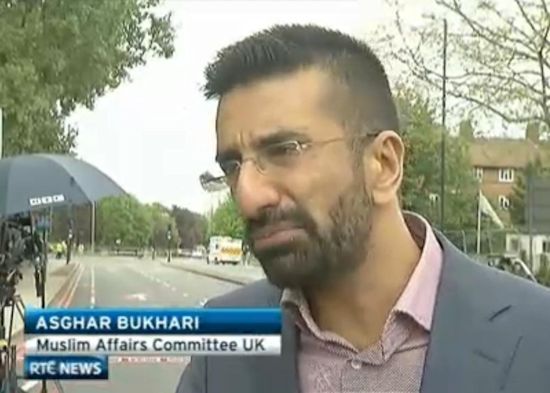

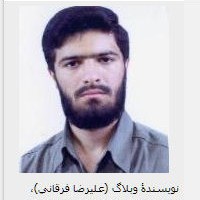
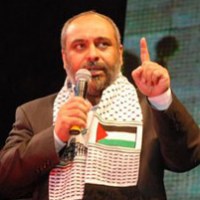
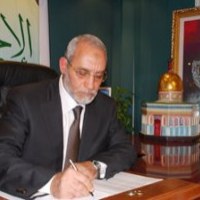
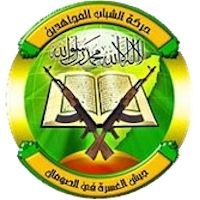




[…] Bukhari, leader and a founding member of the Muslim Public Affairs Committee UK (MPAC UK) featured quite widely in the mainstream media in the aftermath of the shocking attack on Lee Rigby, a twenty-five year […]